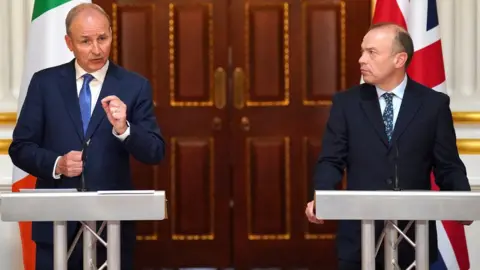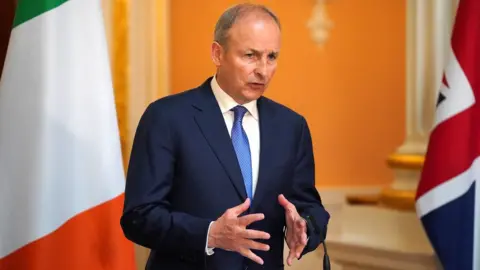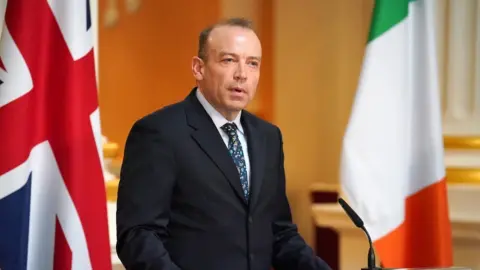NI legacy bill: UK and Irish governments clash at ministerial meeting
 PA Media
PA MediaThe British and Irish governments have clashed over the UK's controversial bill dealing with the legacy of the Troubles in Northern Ireland.
It happened during a meeting of the British Irish Intergovernmental Conference in London (BIIGC) on Monday.
It is understood Irish delegation raised concerns over the impact on investigations into loyalists attacks in the Republic of Ireland.
The BIIGC was set up by the Good Friday Agreement and meets twice a year.
The UK government's legislation on dealing with the legacy of the Troubles in Northern Ireland offers a conditional amnesty to those accused of killings and other Troubles-related crimes.
'Not compliant with human rights'
It has been criticised by victims' groups, the Irish government and political parties at Stormont.
 PA Media
PA MediaOn Monday, it is understood the UK government was challenged on how its plan to end all police investigations as part of its legacy bill will affect ongoing Garda (Irish police) investigations into loyalist attacks.
Irish government representatives highlighted both the Dublin and Monaghan bombings in 1974 when 33 people were killed and also the loyalist bomb attacks in Belturbet, County Cavan, in 1972 when two teenagers were fatally injured.
Last year Gardaí released two photofit images of a suspect in the Belturbet attacks as part of its cross-border investigation.
Speaking at a press conference, Tánaiste (Irish deputy prime minister) Micheál Martin said both governments needed to work together on the issue of legacy.
He said he had an issue with people being granted immunity.
"We have fundamental concerns about the legislation currently before parliament," Mr Martin told the BIIGC press conference.
"We don't believe it is compliant with the European Convention on Human Rights," he added.
 PA Media/Brian Lawless
PA Media/Brian LawlessMeanwhile, the Stormont stalemate was top of the agenda at the meeting for Northern Ireland secretary Chris Heaton-Harris.
He said both governments were in "complete agreement" on the need for the restoration of the Northern Ireland executive.
Mr Heaton-Harris said the local election results highlighted that the people of Northern Ireland wanted restoration as well.
Sinn Féin emerged as the biggest party in both local government and the Stormont assembly following recent elections.
Last week, DUP leader Jeffrey Donaldson said the UK government was well aware of his party's concerns on the protocol which needed to be addressed before a return to Stormont.
'Unacceptable'
Sinn Féin vice-president Michelle O'Neill called on the DUP to clarify what it has asked the government for in relation to the working of the NI Protocol.
Ms O'Neill said it was "unacceptable" that the DUP seemed to be holding private discussions with the government.
Asked about Monday night's Commons debate on the privileges committee report that found former PM Boris Johnson misled parliament, Ms O'Neill said she would not comment on how MPs should vote but said "Boris Johnson has been a disaster from start to finish".
MPs later voted by a margin of 354 to seven to approve the report.
The BIIGC is one of the few such bodies unaffected by the Democratic Unionist Party's (DUP) boycott of Stormont.
Mr Heaton-Harris's number two, Steve Baker, and Irish Justice Minister Helen McEntee were also at the meeting.
The meeting was held as talks continued between the UK government and the DUP.
It is understood the party is looking for changes to the legislation governing the Northern Ireland Protocol as well as further constitutional guarantees.
Last week Mr Heaton-Harris caused raised eyebrows when he said he did not know what the DUP was asking for - a view contradicted by the party leader Sir Jeffrey Donaldson.
On Friday, at a meeting of the British Irish Council in Jersey, Levelling Up Secretary Michael Gove said he was sure Mr Heaton-Harris would "listen respectfully" to the DUP's position.
Taoiseach (Irish Prime Minister) Leo Varadkar said his government could only play a supporting role.
